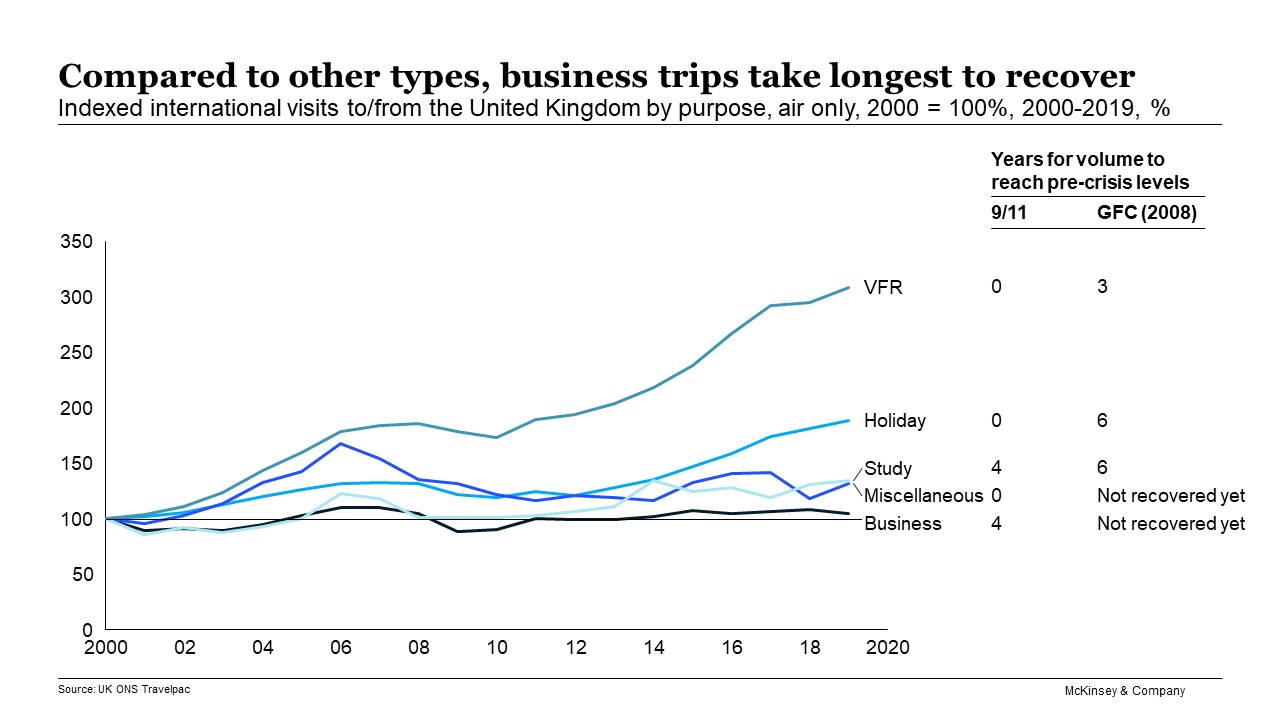
It’s difficult to overstate the devastation wrought by the COVID-19 pandemic on airlines. In 2020, industry revenues totaled $328 billion, around 40 percent of the previous year’s. The sector is expected to be smaller for years to come; we project traffic won’t return to 2019 levels before 2024.
Financial woes aside, the pandemic’s longer-term effects on aviation are emerging. Some of these are obvious, such as more stringent hygiene and safety standards, and a greater focus on sustainability and digitalization.
Other effects, though, are more profound. COVID-19 has changed consumer behavior—and the airline sector—irrevocably. One of these fundamental shifts is the growing prominence of leisure trips.
Leisure trips will fuel the recovery
Business travel will take the longest to recover, and even then, we estimate only likely to around 80 percent of prepandemic levels. In previous crises, leisure trips or visits to friends and relatives tended to rebound first, as was the case in the United Kingdom following 9/11 and the global financial crisis (Exhibit 1). Not only did business trips take four years to return to precrisis levels after the attacks on the World Trade Center but they also had not yet recovered to pre-financial-crisis levels when COVID-19 broke out in 2020. We expect that as this pandemic subsides, the rise in leisure trips will outpace the recovery of business travel.

Exhibit: Air travel demand recovery in previous crises (United Kingdom)
While leisure passengers fill up most of the seats on flights and cover a portion of fixed costs, their overall financial contributions in net marginal terms is negligible, if not negative. Most of the profits earned on a long-haul flight are generated by a small group of high-yielding passengers, often traveling for business. But this pool has shrunk because of the pandemic.
Airlines should revisit flight economics
Airlines should reevaluate the economics of their long-haul operations. First, a structurally smaller contribution from business traffic could necessitate a different pricing logic. Most carriers price point-to-point nonstop flights at a premium today. Travelers who value time over price—mostly business travelers—book these nonstop flights. Leisure travelers, even those traveling in premium classes, are more price sensitive and may choose an indirect routing. This large gap between nonstop pricing and connect pricing may need to narrow.
Second, lower business traffic may require network changes. Airlines added many flights over the past few years between hubs and smaller cities, using small-size widebodies such as the Boeing 787. These flights work because of the high-yielding business demand. With less business demand, economics favor larger aircraft flying less frequently. Larger aircraft such as Airbus A350s or Boeing 777s—which have lower unit costs—may become the base of the long-haul network.
Third, airlines may also look at reconfiguring cabin layouts to accomodate leisure traffic. Lower business-class demand may warrant smaller business-class cabins. Develop and improve products catering to premium-leisure passengers, including premium-economy cabins or business-class seats designed for couples or groups.
The shape of the post-COVID-19 airline sector is becoming clearer and holds lessons for airlines today. People are itching to travel again for holidays; taking steps now will help airlines thrive when they finally can.
Jaap Bouwer is a senior expert in McKinsey’s Amsterdam office, Steve Saxon is a partner in the Shenzhen office, and Nina Wittkamp is a partner in the Munich office. The authors wish to thank Alex Dichter and Vik Krishnan for their contributions to this article.
McKinsey & Company